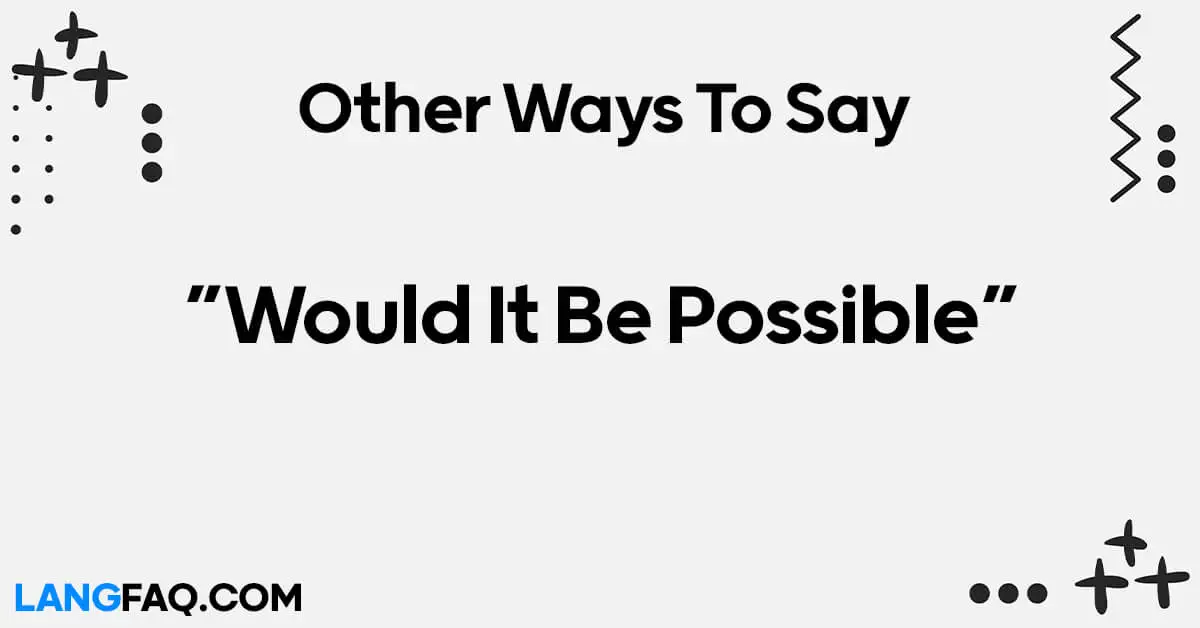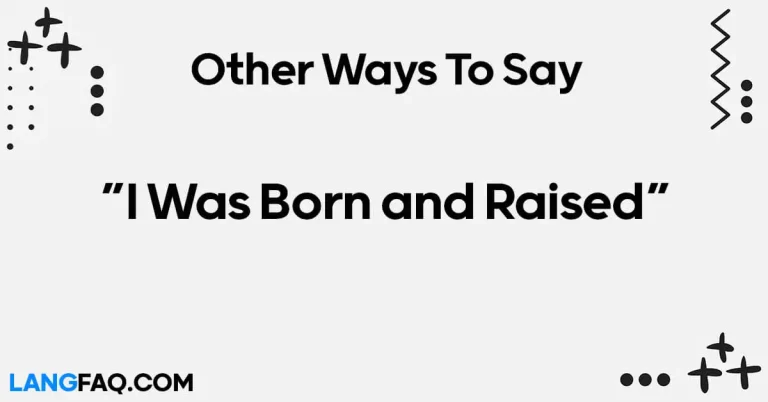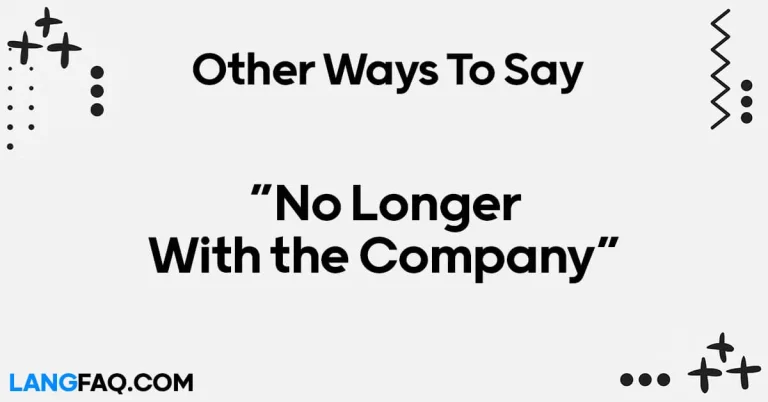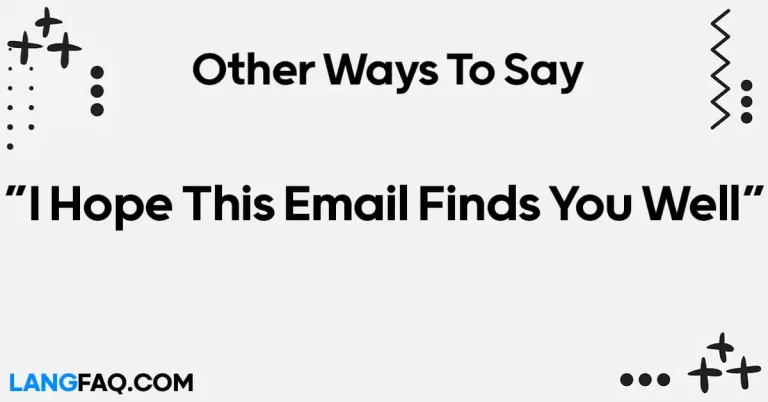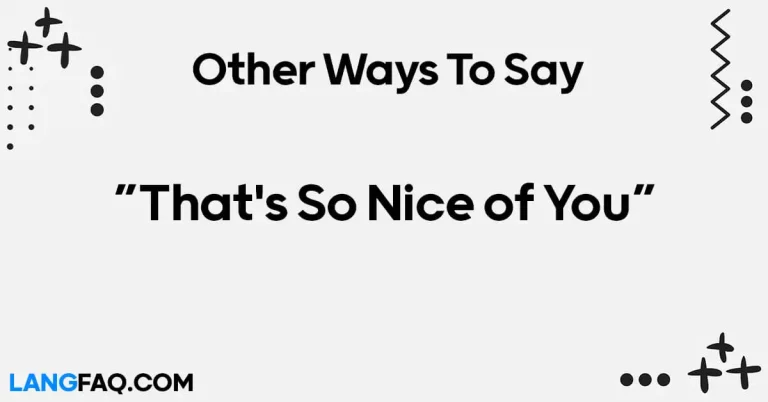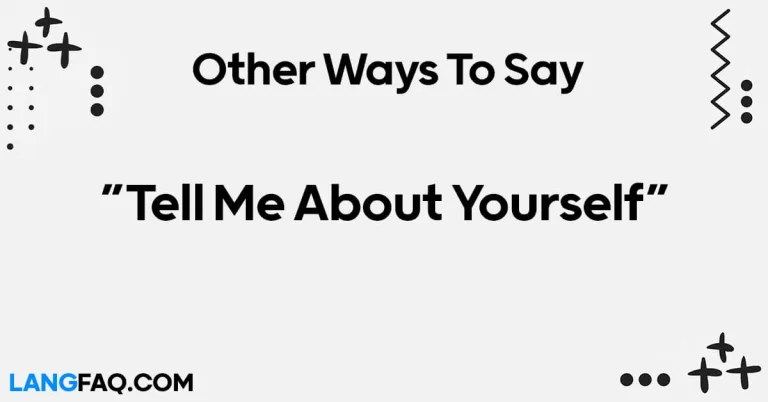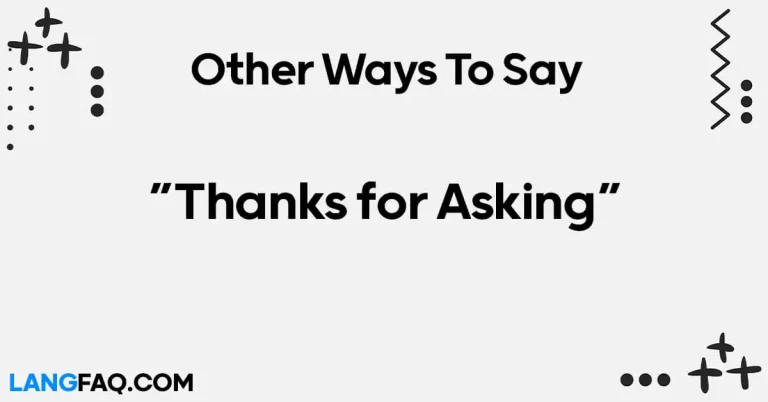In our linguistic journey, the phrase “Would It Be Possible” has been a faithful companion, helping us navigate through countless inquiries. However, language thrives on diversity, and expanding our conversational repertoire is essential. In this article, we’ll delve into 12 alternative ways to convey the same idea, enriching your communication skills and adding flair to your expressions.
12 Other Ways to Say “Would It Be Possible”
Here are 12 alternative ways to express “Would It Be Possible”:
- Is It Feasible?
- Could This Work?
- Might It Be Achievable?
- Any Chance of This Happening?
- Can We Make It Occur?
- Is It Within Reach?
- Do You See Potential in This?
- Could We Implement This?
- Is This Attainable?
- Any Way to Accomplish This?
- Do You Envision This Taking Place?
- Could We Bring This to Fruition?
Here’s a table with the meanings and examples of the 12 alternative ways to express “Would It Be Possible”:
| Expression | Meaning | Example Sentence |
|---|---|---|
| Is It Feasible? | Inquiring about the practicality or possibility of something | Is it feasible to complete the project by next week? |
| Could This Work? | Seeking confirmation on the viability of an idea or plan | Could this work as a solution to the current issue? |
| Might It Be Achievable? | Expressing uncertainty about the attainability of a goal | Might it be achievable to finish the task by Friday? |
| Any Chance of This Happening? | Asking about the probability or likelihood of an event | Is there any chance of this happening in the future? |
| Can We Make It Occur? | Suggesting collaboration to bring a plan or idea to reality | Can we make it occur by working together on this task? |
| Is It Within Reach? | Inquiring if the solution is easily accessible or attainable | Is it within reach to get the required resources? |
| Do You See Potential in This? | Seeking acknowledgment of the possibilities in a proposal | Do you see potential in implementing this strategy? |
| Could We Implement This? | Asking if a particular plan or action can be put into effect | Could we implement this new policy in the organization? |
| Is This Attainable? | Inquiring about the achievability or realizability of an idea | Is this attainable given the current circumstances? |
| Any Way to Accomplish This? | Asking for possible methods or approaches to achieve a goal | Is there any way to accomplish this without delays? |
| Do You Envision This Taking Place? | Seeking a vision or perspective on the likelihood of an event | Do you envision this taking place in the near future? |
| Could We Bring This to Fruition? | Expressing the desire to see a plan or idea successfully completed | Could we bring this project to fruition with our efforts? |
These alternative expressions provide a rich tapestry of ways to convey the notion of “Would It Be Possible.” Whether you’re seeking practical solutions, exploring collaboration, or assessing the feasibility of an idea, these varied phrases offer nuance and depth to your communication.
By incorporating these alternatives, you can elevate your conversations, making them more engaging and adaptable to different contexts. Remember, language is a dynamic tool, and embracing these alternatives enhances your ability to express ideas with precision and creativity.
Is It Correct to Say “Would It Be Possible”?
Yes, “Would It Be Possible?” is a grammatically correct and commonly used phrase in English. This expression is often employed when making polite inquiries or requests. It is a formal and courteous way to ask if something can be done or if a certain situation is feasible.
Usage Examples:
- Professional Inquiry:
- Email Subject: Inquiry Regarding Project Deadline
Email Body: “I trust this email finds you well. Would it be possible to receive the project updates by the end of the week?”
- Email Subject: Inquiry Regarding Project Deadline
- Casual Conversation:
- Text Message: “Hey, I was wondering if we could meet up this weekend. Would it be possible for you?”
Variations:
- Is it possible?
- Can we make this happen?
- Any chance we could do this?
Tips:
- Use “Would It Be Possible?” in formal and polite contexts.
- Consider the formality of the situation; this phrase is suitable for professional emails, requests, or formal inquiries.
- It is often used to introduce a request or inquiry in a courteous manner.
Professional Mail Example With “Would It Be Possible”
Subject: Inquiry Regarding Project Deadline
Dear [Recipient’s Name],
I hope this email finds you well. I am writing to discuss the current status of our ongoing project and to inquire about the possibility of receiving the project updates by the end of the week.
As we approach the deadline, it is crucial for us to have a comprehensive overview of the progress made and any potential challenges that may impact the project timeline. Your insights and updates will greatly contribute to the successful completion of this endeavor.
Given the complexity of the tasks at hand, would it be possible for you to provide a detailed update on the project status, including any milestones achieved and upcoming action items, by Friday?
Your prompt attention to this matter is highly appreciated, and I believe that having this information will enable us to make informed decisions and ensure the successful outcome of the project.
If you have any concerns or require additional information to facilitate this process, please do not hesitate to reach out. I value your expertise and commitment to our shared goals, and I look forward to your timely response.
Thank you for your attention to this matter.
Best regards,
[Your Full Name] [Your Position] [Your Company] [Contact Information]
Is It Feasible?
In the realm of problem-solving and decision-making, the question of feasibility often takes center stage. “Is It Feasible?” is a versatile inquiry applicable in both formal and informal settings. This phrase is perfect when assessing the practicality or viability of a proposed solution or action.
Scenario: Professional Setting
In a corporate meeting, when discussing a new project deadline, you might ask, “Is it feasible to complete the project within the given timeframe?” This formal tone acknowledges the constraints of the task and seeks a realistic evaluation.
Scenario: Casual Conversation
In a friend’s ambitious plan to organize a surprise party within a day, you might ask, “Is it feasible to arrange everything in such a short time?” Here, the word ‘feasible’ maintains a formal touch even in a casual conversation, emphasizing the challenges.
Example Sentence:
Formal Email:
Subject: Inquiry Regarding Project Deadline
Dear [Recipient’s Name],
I trust this email finds you well. I am writing to discuss the proposed project deadline. Could you please provide insight into whether it is feasible to complete all tasks within the given timeframe?
Thank you for your time and consideration.
Best regards,
[Your Name]
Casual Text Message:
Hey [Friend’s Name]! Heard about the surprise party plan. Is it feasible to get everything ready by tomorrow? Let me know how I can help!
Variations:
- Is it practically achievable?
- Can we realistically accomplish this?
Tips:
- Use ‘Is It Feasible?’ when discussing plans or proposals that require a thorough evaluation of practicality.
- Ensure to maintain a professional tone in formal contexts to convey seriousness.
Could This Work?
When seeking affirmation or exploring potential solutions, the phrase “Could This Work?” opens the door to collaboration and problem-solving. It’s a versatile and optimistic inquiry suitable for various situations.
Scenario: Team Collaboration
In a team meeting, discussing innovative ideas for a marketing campaign, you might suggest, “Could this work as our next advertising strategy?” This question invites team members to share their insights and brainstorm collectively.
Scenario: Personal Decision-Making
When friends are contemplating weekend plans, you might suggest, “Could this work for everyone?” Here, the phrase maintains a casual and inclusive tone, fostering open communication.
Example Sentence:
Formal Email:
Subject: Proposal Evaluation
Dear [Recipient’s Name],
I hope this email finds you in good spirits. I wanted to discuss the recent proposal and explore whether the suggested approach aligns with our objectives. Could this work as our new strategy?
Looking forward to your input.
Best regards,
[Your Name]
Casual Dialogue Snippet:
Friend 1: “I was thinking of a beach day this weekend. What do you guys think?”
Friend 2: “Could this work for everyone?”
Friend 3: “Sounds great! Count me in!”
Variations:
- Can this be a viable option?
- Is this a potential solution?
Tips:
- Use ‘Could This Work?’ when seeking input or evaluating the viability of a proposed idea.
- Maintain a positive and open tone to encourage collaboration and brainstorming.
Might It Be Achievable?
Delving into a realm of uncertainty while maintaining a formal touch, “Might It Be Achievable?” is an excellent choice when questioning the practicality of a goal or objective. This phrase is particularly suitable for situations where one is seeking a nuanced perspective on the likelihood of success.
Scenario: Project Evaluation
In a professional context, during a project evaluation meeting, you might ask, “Might it be achievable to meet the quality standards within the given timeline?” Here, the phrase conveys a sense of thoughtful consideration and acknowledges the potential challenges.
Scenario: Academic Discussion
When discussing academic goals with a mentor or advisor, you might inquire, “Might it be achievable to complete the research paper within the semester?” This formal approach shows respect for the advisor’s insights and expertise.
Example Sentence:
Formal Email:
Subject: Inquiry Regarding Project Timelines
Dear [Recipient’s Name],
I trust this email finds you well. As we evaluate the project timelines, I would appreciate your perspective on whether it might be achievable to meet the outlined quality standards within the given timeframe.
Thank you for your time and expertise.
Best regards,
[Your Name]
Academic Conversation:
Student: “I’m considering completing my research paper this semester. What do you think, might it be achievable?”
Mentor: “Given your dedication and the resources available, it might indeed be achievable. Let’s plan accordingly.”
Variations:
- Could this goal be attainable?
- Is there a chance we can achieve this?
Tips:
- Use ‘Might It Be Achievable?’ in situations where acknowledging uncertainty is crucial.
- Employ this phrase in formal discussions, particularly when seeking expert opinions.
Any Chance of This Happening?
Inquiring about the probability or likelihood of an event, “Any Chance of This Happening?” adds a touch of informality while maintaining a straightforward and direct approach. This phrase is suitable for a wide range of scenarios, from casual conversations to professional discussions.
Scenario: Event Planning
When discussing potential dates for an upcoming event with a friend, you might ask, “Any chance of this happening next weekend?” This informal yet clear question helps streamline the planning process.
Scenario: Business Proposal
In a business context, when evaluating the success of a new proposal, you might inquire, “Any chance of this happening within the current market conditions?” This question is both specific and open-ended, encouraging detailed feedback.
Example Sentence:
Casual Text Message:
You: “Hey, thinking of a movie night next Friday. Any chance of this happening?”
Friend: “Sounds good! I’m in. Any specific movie in mind?”
Business Email:
Subject: Assessment of New Business Proposal
Dear [Recipient’s Name],
I hope this email finds you well. As we delve into the assessment of the new business proposal, could you provide insights into any chance of this happening within the current market conditions?
Your feedback is highly appreciated.
Best regards,
[Your Name]
Variations:
- Is there a likelihood of this occurring?
- Do you see any possibility of this happening?
Tips:
- Use ‘Any Chance of This Happening?’ when seeking straightforward and clear responses.
- Maintain a balance between informality and professionalism based on the context.
Can We Make It Occur?
Infusing a collaborative spirit into your inquiry, “Can We Make It Occur?” is a powerful phrase that implies joint effort and determination. It’s suitable for scenarios where teamwork and shared responsibility are essential.
Scenario: Team Project
During a team project discussion, you might propose, “Can we make it occur within the given timeframe?” This question not only seeks approval but also emphasizes the collective responsibility of the team.
Scenario: Family Decision-Making
When discussing a family event or decision, you might ask, “Can we make it occur before Grandma’s birthday?” This phrase adds a positive tone to the discussion, fostering a sense of unity within the family.
Example Sentence:
Professional Meeting:
Team Leader: “Considering our project deadline, can we make it occur as planned, or should we reassess our timeline?”
Team Member: “I believe with proper coordination, we can make it occur without compromising quality.”
Family Conversation:
You: “I was thinking of organizing a small surprise for Grandma. Can we make it occur before her birthday next month?”
Family Member: “Absolutely! Let’s start planning.”
Variations:
- Could we bring this to fruition together?
- Are we capable of making this happen collectively?
Tips:
- Use ‘Can We Make It Occur?’ when emphasizing collaboration and joint effort.
- Encourage positive responses by highlighting the collective nature of the task.
Is It Within Reach?
Introducing a tactile and accessible metaphor, “Is It Within Reach?” is a phrase that combines formality with a touch of informality. It’s ideal for situations where the feasibility of an idea or plan needs to be assessed.
Scenario: Project Evaluation
In a business context, when discussing the feasibility of a new project, you might inquire, “Is it within reach to accomplish the project goals within the allocated budget?” This question brings attention to practicality and accessibility.
Scenario: Personal Goal Setting
When discussing personal goals with a friend, you might ask, “Is it within reach for you to achieve this by the end of the year?” Here, the phrase adds a supportive touch while addressing the practicality of the goal.
Example Sentence:
Formal Email:
Subject: Inquiry Regarding Project Feasibility
Dear [Recipient’s Name],
As we evaluate the feasibility of the proposed project, could you provide insights into whether it is within reach to achieve the outlined goals within the allocated budget?
Your expertise is highly valued.
Best regards,
[Your Name]
Casual Conversation:
Friend: “I’ve set some ambitious fitness goals. Is it within reach for me to achieve them by December?”
You: “Absolutely! With dedication and a plan, it’s definitely within reach.”
Variations:
- Can we realistically attain this?
- Is achieving this within our grasp?
Tips:
- Use ‘Is It Within Reach?’ to assess the practicality of goals or plans.
- Infuse positivity by assuring that the goal is attainable with effort and planning.
Do You See Potential in This?
When seeking a nuanced perspective on the viability and possibilities of an idea, “Do You See Potential in This?” is an insightful phrase. It’s suitable for situations where you want to gauge someone’s opinion while maintaining a formal tone.
Scenario: Proposal Evaluation
In a business meeting discussing a new proposal, you might ask, “Do you see potential in this approach, considering our company’s goals?” This question invites thoughtful analysis and aligns with a professional setting.
Scenario: Creative Collaboration
When brainstorming with colleagues on a creative project, you might inquire, “Do you see potential in incorporating these design elements?” Here, the phrase fosters an open discussion while emphasizing the exploration of creative possibilities.
Example Sentence:
Formal Email:
Subject: Seeking Input on Proposal
Dear [Recipient’s Name],
I trust this email finds you well. As we delve into the evaluation of the new proposal, I am keen to know whether you see potential in this approach, especially concerning our company’s overarching goals.
Your insights are highly valued.
Best regards,
[Your Name]
Creative Discussion:
Team Member 1: “I was thinking of incorporating a new color palette into the design. Do you see potential in this?”
Team Member 2: “Absolutely! It could add a fresh and vibrant dimension to our project.”
Variations:
- Can you envision potential in this?
- Is there promise in pursuing this direction?
Tips:
- Use ‘Do You See Potential in This?’ in professional discussions to gather thoughtful opinions.
- Encourage detailed feedback by framing the question around the potential of the idea.
Could We Implement This?
For situations demanding actionable decisions, “Could We Implement This?” is a powerful phrase that suggests a willingness to take a proposed idea or plan into practical application. It’s suitable for both professional and collaborative settings.
Scenario: Project Planning
In a project planning meeting, you might suggest, “Considering the advantages, could we implement this strategy in the upcoming phase?” This question opens the floor for practical discussions on the implementation feasibility.
Scenario: Collaborative Project
When collaborating on a group project, you might ask, “Could we implement this collaborative tool to streamline our workflow?” The phrase implies shared decision-making and a readiness for joint action.
Example Sentence:
Professional Meeting:
Project Manager: “The team has proposed a new methodology. Could we implement this in the next phase for a trial period?”
Team Member: “I believe it aligns with our objectives. Let’s discuss the implementation process.”
Collaborative Discussion:
You: “I’ve found a tool that could enhance our collaboration. Could we implement this in our next project?”
Colleague: “Sounds promising! Let’s explore the implementation steps together.”
Variations:
- Can we put this into practice?
- Is it feasible to execute this plan?
Tips:
- Use ‘Could We Implement This?’ when discussing practical steps for applying a proposed idea.
- Encourage active participation and collaboration by implying joint decision-making.
Is This Attainable?
Delving into the realm of achievability, “Is This Attainable?” is a direct and formal phrase suitable for situations where a clear assessment of feasibility is required. Whether in professional settings or personal endeavors, this question seeks a straightforward evaluation of the potential success of an idea or plan.
Scenario: Project Evaluation
In a corporate setting, during a project evaluation meeting, you might pose the question, “Is this attainable within the given resources and timeline?” This inquiry prompts a detailed examination of the practicality and achievability of the proposed project.
Scenario: Personal Goal Setting
When discussing personal goals with a mentor or advisor, you might inquire, “From your perspective, is this attainable within the set time frame?” This phrase maintains a formal tone while seeking expert guidance on the feasibility of individual aspirations.
Example Sentence:
Professional Email:
Subject: Request for Project Feasibility Evaluation
Dear [Recipient’s Name],
I trust this email finds you well. As we proceed with the project evaluation, I am eager to understand whether the outlined goals are attainable within the given resources and timeline.
Your insights are highly valued.
Best regards,
[Your Name]
Personal Conversation:
You: “I’ve set ambitious fitness goals for the next three months. Is this attainable from your perspective?”
Mentor: “Given your dedication, I believe it’s definitely attainable. Let’s outline a plan.”
Variations:
- Can we realistically achieve this?
- Is the goal within reach?
Tips:
- Use ‘Is This Attainable?’ when seeking a clear and direct evaluation of feasibility.
- Employ this phrase in situations where a straightforward assessment is crucial.
Any Way to Accomplish This?
Inquiring about possible methods or approaches, “Any Way to Accomplish This?” is a versatile phrase suitable for various contexts. It is particularly effective when exploring solutions collaboratively or seeking advice on how to achieve a specific goal.
Scenario: Problem-Solving Discussion
During a team meeting focused on problem-solving, you might suggest, “Any way to accomplish this without affecting the current workflow?” This question encourages team members to brainstorm and propose viable solutions.
Scenario: Personal Dilemma
When discussing a personal challenge with a friend, you might ask, “Given your experience, any way to accomplish this more efficiently?” Here, the phrase maintains a friendly and collaborative tone while seeking practical advice.
Example Sentence:
Team Discussion:
Team Member 1: “We’ve encountered a bottleneck in the project timeline. Any way to accomplish this without causing delays?”
Team Member 2: “Perhaps we can redistribute tasks to streamline the process. Let’s explore this further.”
Personal Conversation:
You: “I’ve been struggling to manage my time effectively. Any way to accomplish my tasks more efficiently?”
Friend: “I faced a similar challenge. One strategy is to prioritize tasks based on deadlines. It might help!”
Variations:
- Can we find a way to achieve this?
- Is there a method to accomplish this goal?
Tips:
- Use ‘Any Way to Accomplish This?’ when seeking collaborative problem-solving or practical advice.
- Encourage open discussions and creative thinking to explore various approaches.
Do You Envision This Taking Place?
Adding a touch of foresight to your inquiry, “Do You Envision This Taking Place?” is a phrase that invites a visionary perspective on the likelihood of an event or idea becoming a reality. It’s suitable for situations where you want to emphasize the importance of a forward-thinking outlook.
Scenario: Future Planning
In a strategic planning session, you might ask, “Do you envision this taking place in the future, considering the evolving market trends?” This question encourages stakeholders to consider the long-term implications and adaptability of the proposed idea.
Scenario: Creative Project
When collaborating on a creative project, you might inquire, “Do you envision this taking place in our final product, or should we explore alternative approaches?” This phrase maintains a creative and open-ended tone, fostering a discussion about potential outcomes.
Example Sentence:
Strategic Meeting:
Team Leader: “As we plan for the next quarter, do you envision this taking place in our long-term strategy given the current industry shifts?”
Team Member: “Considering the trends, I envision this becoming a key component of our future initiatives.”
Creative Project Discussion:
You: “I’ve been thinking of incorporating a unique visual element. Do you envision this taking place in our final product?”
Colleague: “Absolutely! It adds a distinctive touch that aligns with our creative vision.”
Variations:
- Can you see this happening in the future?
- Do you foresee this taking place?
Tips:
- Use ‘Do You Envision This Taking Place?’ when emphasizing a forward-thinking perspective.
- Encourage stakeholders to consider the long-term implications and possibilities of the proposed idea.
Could We Bring This to Fruition?
Infusing a sense of accomplishment into your inquiry, “Could We Bring This to Fruition?” is a powerful phrase that conveys determination and a proactive approach to making an idea or plan a reality. It’s suitable for situations where you want to emphasize collective effort and commitment.
Scenario: Project Kickoff
In a project kickoff meeting, you might propose, “Considering our skills and resources, could we bring this to fruition within the project timeline?” This question fosters a sense of collective responsibility and determination.
Scenario: Team Collaboration
When collaborating with a team, you might ask, “Could we bring this to fruition by combining our expertise and efforts?” This phrase implies a shared commitment to achieving a common goal.
Example Sentence:
Project Kickoff Meeting:
Project Manager: “We have an ambitious project ahead. Could we bring this to fruition by leveraging our team’s strengths and resources?”
Team Member: “Absolutely! Let’s create a plan to ensure successful implementation.”
Team Collaboration:
You: “I have an idea for improving our workflow. Could we bring this to fruition by collaborating on its implementation?”
Team Member: “I’m on board! Let’s discuss the steps to make it happen.”
Variations:
- Can we make this happen together?
- Is there potential to bring this to fruition collectively?
Tips:
- Use ‘Could We Bring This to Fruition?’ when emphasizing collective effort and commitment.
- Encourage a proactive mindset and a sense of shared responsibility among team members.
FAQs
How do I use these alternatives in professional settings?
In professional settings, choose alternatives that align with the formality of the context. Phrases like “Is It Achievable?” or “Feasible Scenario?” can be suitable.
Are these alternatives universally understood?
Yes, these alternatives are versatile and can be understood in various contexts. However, consider the tone and formality of your communication.
Can I use these expressions interchangeably?
While these alternatives convey a similar idea, slight nuances exist. Tailor your choice based on the specific tone and emphasis you wish to convey.
Do these alternatives work in written communication?
Absolutely. These alternatives can enhance written communication, adding variety and depth to your expressions.
Are these alternatives suitable for formal requests?
Yes, many of these alternatives are suitable for formal requests. Choose expressions that align with the level of formality required.
Can I mix and match these alternatives in a single conversation?
Certainly. Mixing these alternatives can showcase your versatility and adaptability in communication.
Conclusion
Diversifying our language allows us to communicate more effectively and express ourselves with nuance. The next time you ponder, “Would It Be Possible,” remember these 12 alternatives that can elevate your communication and make your inquiries more engaging.

